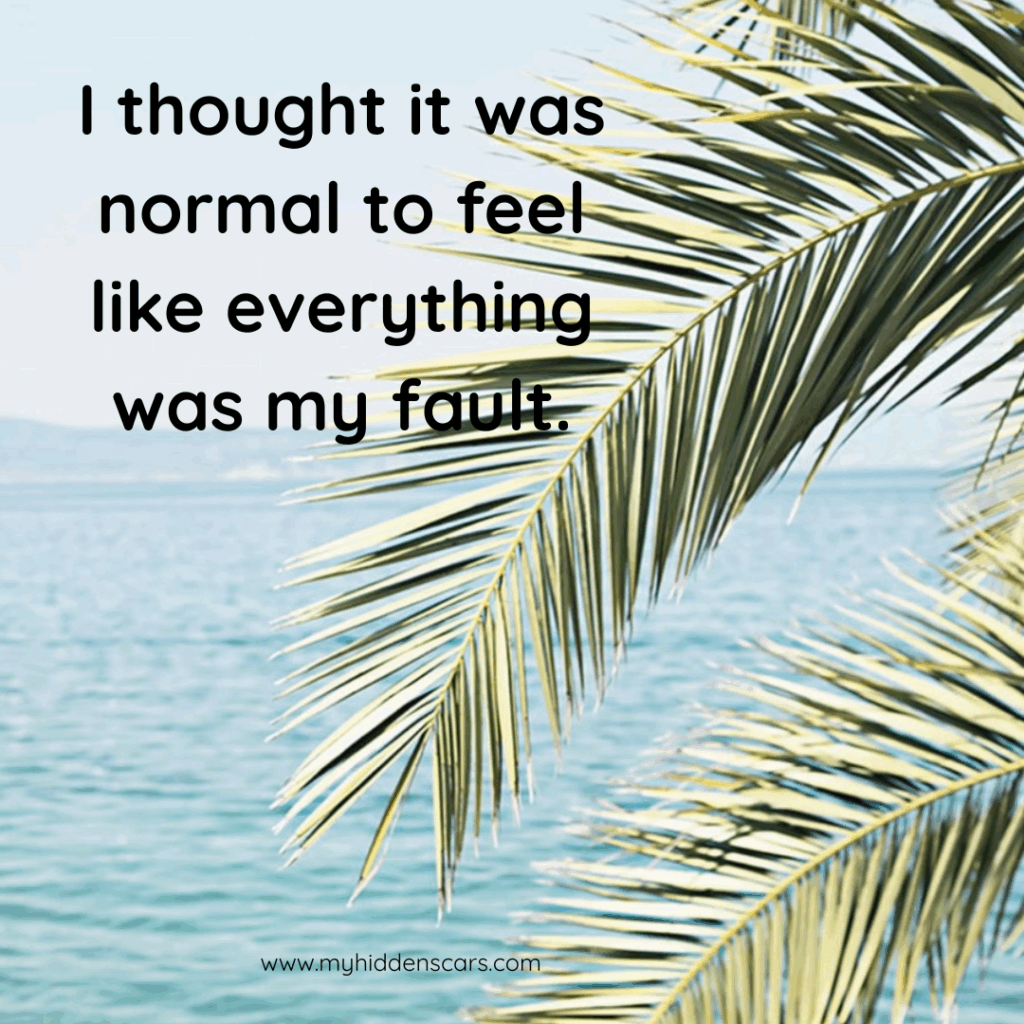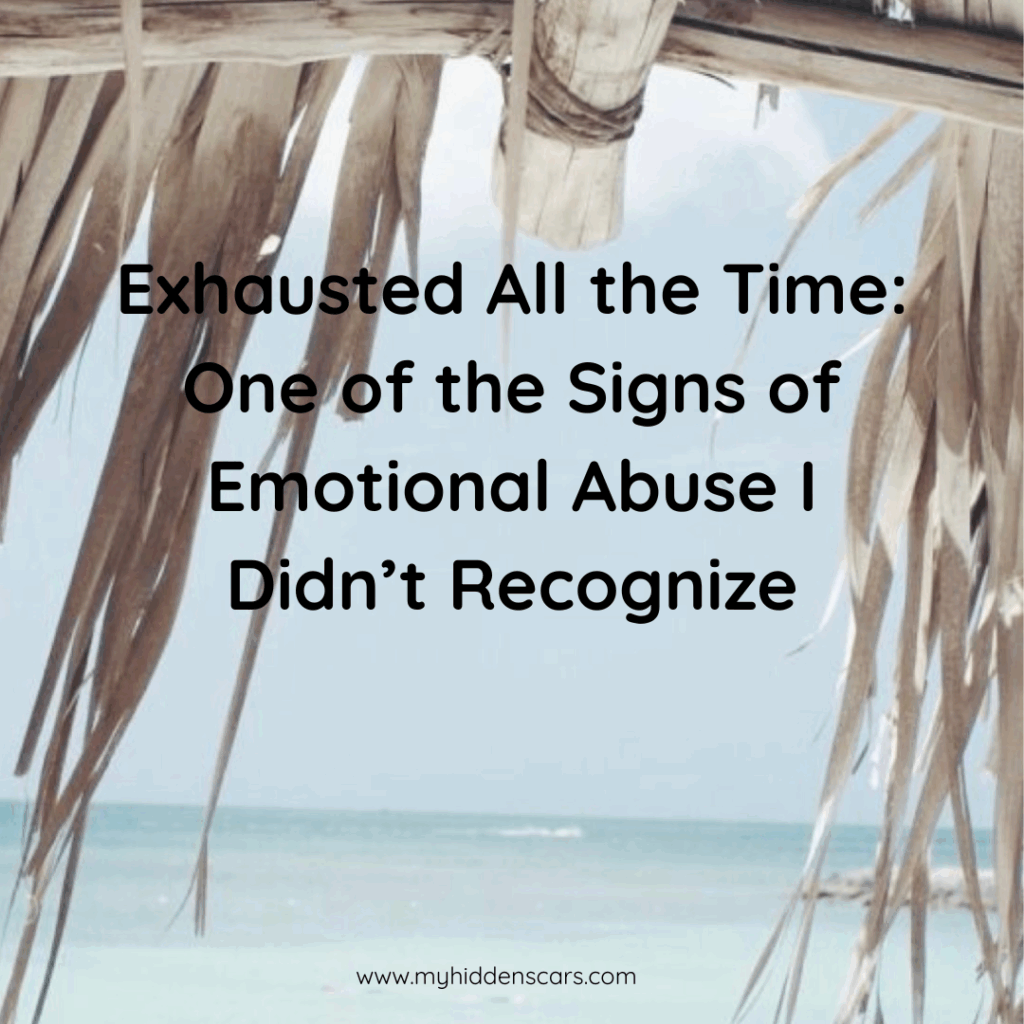I remember sitting in the car, dreading going inside. I had dinner in my hands, a smile on my face, and a knot in my stomach.
That’s the thing about emotional abuse, especially the early signs. You don’t always recognize the signs of emotional abuse while they’re happening.
Sometimes, you only see them when you look back.
For a long time, I didn’t use the word “abuse.”
He wasn’t yelling all the time. He wasn’t hitting me. We were married. We had a life together.
I told myself that all relationships have hard seasons. That maybe I just needed to be more patient. More understanding. Less sensitive.
I didn’t realize that abuse could look quiet. That it could hide behind smiles and apologies.
I didn’t recognize that I was being worn down, slowly, over time, until I couldn’t tell the difference between what I wanted and what would keep the peace.
If you’re reading this and wondering whether it was really abuse… I know how that feels.
You don’t have to have bruises. You don’t have to have all the answers.
I just want to show you what it looked like for me, in case something here helps you name what you’ve been through, too.
Because for so many of us, the signs of emotional abuse weren’t obvious until they were.
I thought it was normal that I was always the one apologizing.
No matter what happened, I somehow ended up saying I was sorry.
I’d bring something up that hurt me, and suddenly, I’d be the one being told I was too sensitive.
Or I’d try to explain how I felt, and end up in an argument where I was the bad guy.
It became easier just to take the blame, smooth things over, and move on.
At the time, I thought that’s just what it meant to be “the bigger person.” But that was one of the early signs of emotional abuse, being trained to believe everything was my fault.
But now I know, I was being trained to take the blame for things that weren’t mine to carry.
I didn’t call it gaslighting back then. I just thought I couldn’t do anything right. But looking back, I see how often my reality was dismissed or twisted until I started believing the problem was me.
Feeling Anxious Before He Got Home Wasn’t Just Stress — It Was Coercive Control
I’d watch the clock, trying to guess what kind of mood he’d be in.
Some days, he walked in and acted like everything was fine. Other days, he was short, irritated, or totally silent.
I’d replay the day in my head, wondering if I did something wrong.
Did I say too much when we talked earlier? Did I forget something I promised to do? Should I have handled something differently with the kids?
I didn’t think of it as fear at the time, I just called it stress. But looking back, I was constantly trying to manage his emotions so things didn’t get worse. That kind of unpredictability, where you’re always adjusting yourself around someone else’s moods, is a big part of how coercive control works.
I had learned to shrink myself before anything even happened.
And that’s not normal. That’s survival.
I thought it was normal not to recognize myself anymore.
I used to be more confident. I laughed more. I had opinions.
But over time, I noticed I was quieter around him. I second-guessed what I wore, how I wore my hair, what I said, and who I talked to.
I started fading into the background of my own life.
I let go of things that made me feel like me, because they annoyed him, or because he made me feel guilty for doing them.
I was still functioning. Still showing up. Still doing everything I was supposed to do.
But I wasn’t really living.
And I didn’t even realize how much I had disappeared until I started coming back.
It’s one of the quietest effects of emotional abuse when you start erasing pieces of yourself to keep the peace. These subtle shifts can be some of the most overlooked signs of emotional abuse, because they happen slowly and quietly, not all at once.

I thought it was normal to feel like everything was my fault.
When something went wrong, a decision, a disagreement, even his mood, I automatically assumed I had caused it.
He didn’t have to yell or threaten.
All he had to do was sigh, get quiet, or say something like “You just don’t understand,” and I’d crumble.
I was always trying to fix things. To calm things down. To be “better” so the next time wouldn’t turn into a problem.
I thought I was being caring. I thought I was being a good partner.
But I was carrying the weight of both of us, and blaming myself for things that had nothing to do with me.
Now I can see how much of that was psychological manipulation, the kind that trains you to believe you’re the reason for everything going wrong, even when you’re not.
I thought hiding parts of my life from my friends and family was normal.
I didn’t realize how much I was leaving out when I talked to people.
I’d change the subject. I’d make excuses. I’d downplay things he said or did, not because I was trying to lie, but because I didn’t want anyone to see it how it really was.
And honestly, I didn’t want to see it either.
I told myself I was being respectful of our relationship, or that it wasn’t anyone else’s business. But I was really just trying to protect myself from the look I might see on someone’s face if I told them the truth.
Deep down, I think I knew something was wrong, and I was afraid of what might happen if someone confirmed it.
This is what emotional isolation can look like, not being locked away, but slowly disconnecting from the people who might help you see things more clearly. Signs of emotional abuse don’t always happen in public. Sometimes, they live in the moments we hide from the people who love us.
I thought it was normal to feel like nothing I did was ever enough.
I was always trying to keep up.
If I did what he asked, he’d want something more. If I fixed one problem, another one popped up.
He’d say things like, “You’re never satisfied,” or “You always find a way to ruin things,” even when I was trying so hard to make everything work.
I kept thinking if I could just find the right balance, the right words, the right timing, the right tone, he’d finally be happy.
But the truth is, he never wanted to be happy.
He wanted control.
That constant shifting of expectations? That’s part of coercive control, where the rules constantly change, and you’re never allowed to win.

Exhausted All the Time: One of the Signs of Emotional Abuse I Didn’t Recognize
Not physically tired, emotionally drained.
I was constantly on edge, constantly overthinking, constantly adjusting.
My mind never got a break.
I’d go to bed feeling tense. I’d wake up already bracing for the day.
Even when things were “fine,” I never really felt safe to relax.
I was managing so many invisible things: what mood he’d be in, what I could or couldn’t say, how to prevent the next explosion.
No one saw how hard I was working just to keep things going.
Now I understand that kind of constant anxiety, the hypervigilance, the overthinking, is often a result of trauma. It’s what happens when you live in a space where emotional safety doesn’t exist.
I didn’t need a label. I needed someone to say, ‘That wasn’t okay.’
Looking Back: The Signs of Emotional Abuse I Didn’t See Until Later
These weren’t just difficult seasons in a relationship.
They were patterns.
Patterns of control, manipulation, and emotional abuse, the exact signs of emotional abuse, I didn’t recognize until much later.
It didn’t feel like abuse back then.
It felt like confusion.
Like walking on eggshells.
Like being the only one trying to make it work.
But now I know, when you’re constantly shrinking, apologizing, or questioning yourself… something’s not right.
And you don’t need a label to trust your gut.
You just need someone who sees it too.
If any part of this sounds familiar… I want you to know: you’re not imagining it.
You’re not overreacting. You’re not too sensitive. And you’re not the problem.
These aren’t small things. They’re not “normal relationship struggles.”
This is what emotional abuse can look like, and you’re allowed to name it, even if no one else sees it.
I know how confusing it is to finally start putting the pieces together.
I’ve walked that road. And I help other women do it too.
If this hit home, you’re not alone — and you don’t have to figure it all out on your own either.
I work with women who are still trying to make sense of what happened — or what’s still happening.
Whether you’re just beginning to question things, or you’ve already left but still feel stuck, I’m here to support you. If you’ve started putting the pieces together and wondering if what you went through was really signs of emotional abuse, I’m here to help.
👉 You can learn more about coaching with me www.myhiddenscars.com
👉 Or join my free support group
And if nothing else, I hope this post helped you feel less alone. You deserve to be safe.
You deserve peace.
And you deserve to come back to yourself, fully.
Reflection prompt: If you saw someone you loved going through what you just read, what would you say to them? What would you want them to know?






thanks for info.